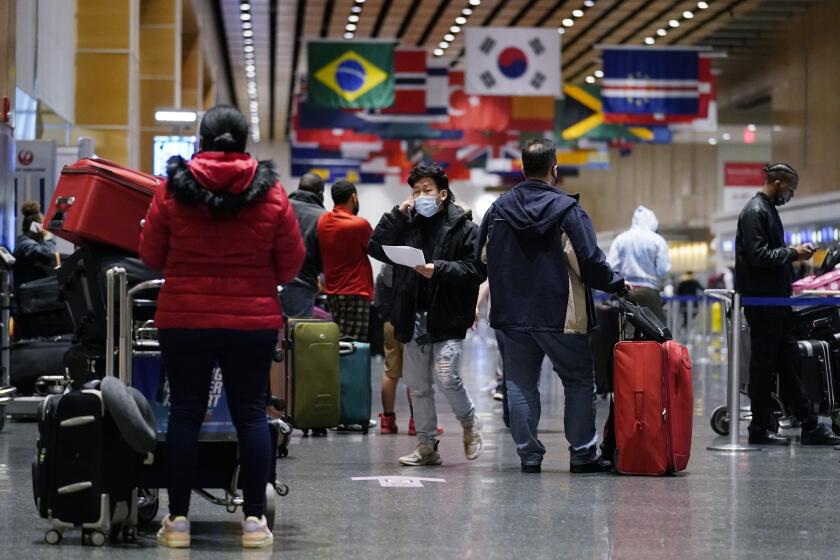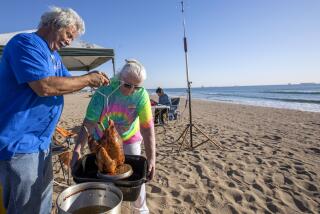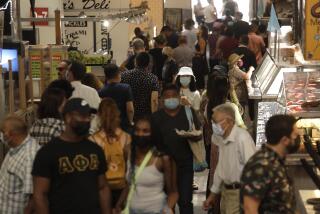Should I stay or should I go? People agonize over holiday travel plans
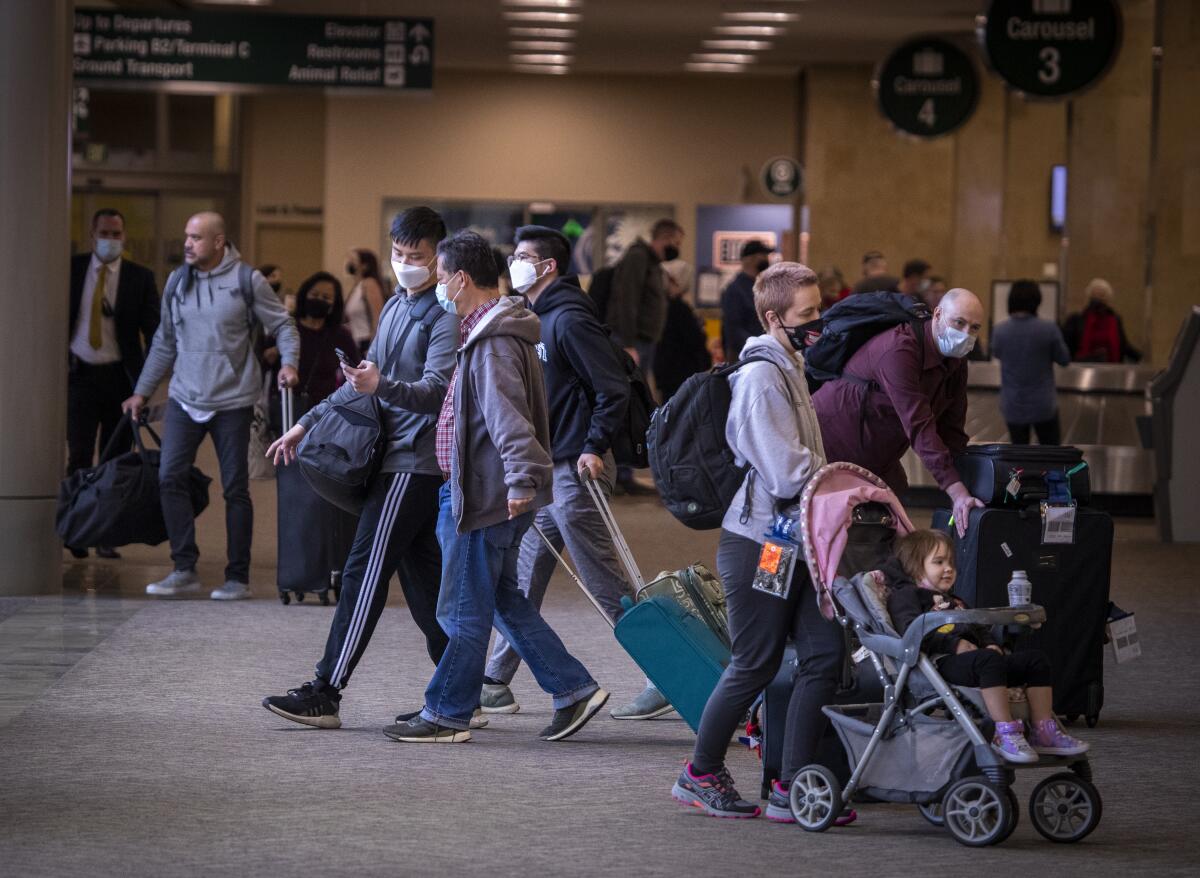
- Share via
As the Omicron variant surged, Tira Palmquist agonized about her trip to Ohio.
The Irvine resident is vaccinated and boosted. But she has a preexisting condition that increases her risk of severe COVID-19. She couldn’t shake a nagging feeling that perhaps she shouldn’t go.
Ultimately, the desire to see her daughter won out.
This week, Palmquist, 58, boarded a plane with her husband, both of them wearing N95 masks.
“This feels like March 2020 all over again,” Palmquist, a playwright, said. “It feels more uncertain and more frightening than it did before.”
Just as life seemed almost back to normal, with children in classrooms, case counts down and dinners with friends resuming, along came Omicron, with its wicked combination of extreme transmissibility and ability to break through some vaccinated people’s defenses.
Airlines canceled hundreds of flights as the omicron variant jumbled schedules and drew down staffing levels at some carriers during the busy holiday travel season.
After sacrificing family get-togethers last Christmas, many Americans had booked plane tickets, hopeful about celebrating safely once again.
Now, they are weighing risks and benefits, in a circular dialogue with no clear answers. What if I give the virus to a vulnerable relative? Can I go another year without seeing my kids? What if we’re still in this situation next year?
Some, like Palmquist, are forging ahead despite their misgivings, sometimes with extra precautions such as testing before and after arrival.
Others are canceling their plans and staying home.
Brian Rosenbaum, 37, planned to fly with his family to the Austrian Alps to spend Christmas with relatives they haven’t seen since the pandemic started.
He was excited about his 3-year-old son and 9-month-old daughter playing in the snow for the first time.
But the children are too young to be vaccinated.
He and his wife consulted their pediatrician, whom Rosenbaum described as “straightforward” and “not super risk-averse.”
“We know that if he were to say something, we should take it really seriously,” Rosenbaum said. “He said, ‘No, don’t go.’”
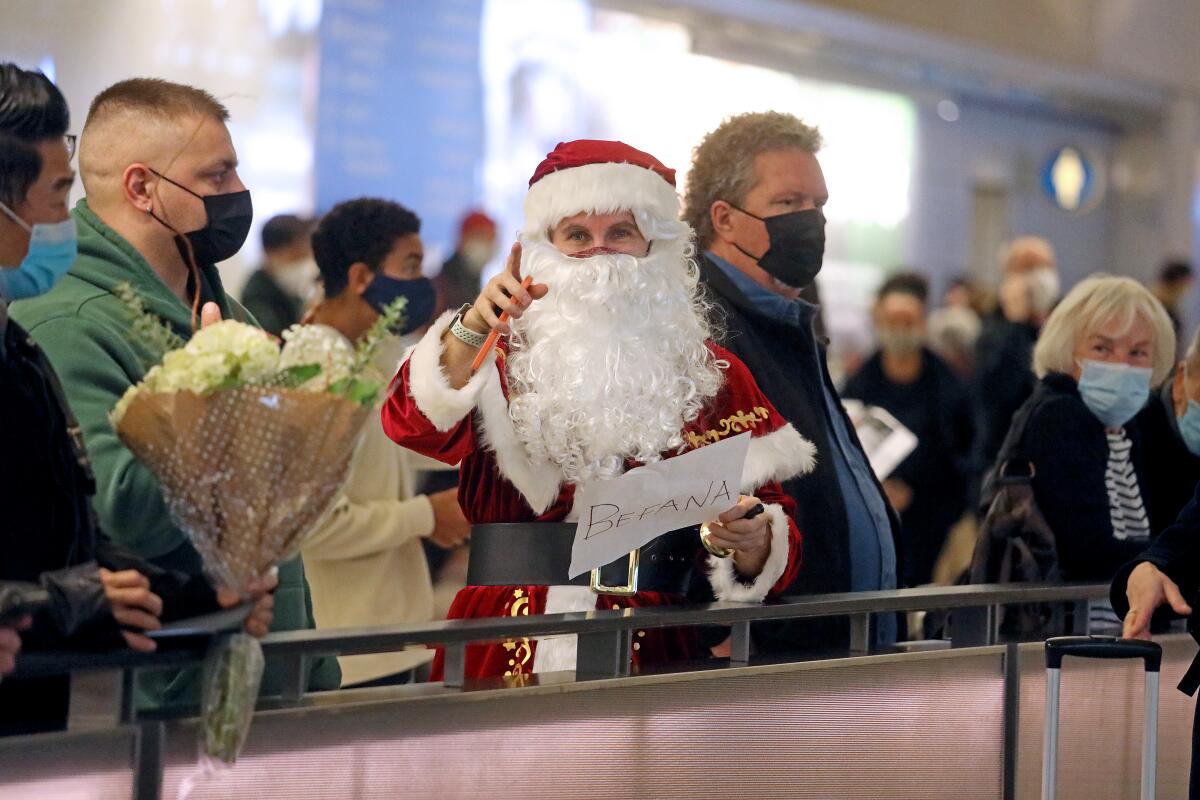
They immediately canceled their flights. Instead, Rosenbaum’s relatives made plans to fly to Los Angeles.
But COVID-19 again reared its head.
On Sunday, Rosenbaum’s brother-in-law said he had tested positive. They wouldn’t be able to travel after all.
Still, Rosenbaum is optimistic that future Christmases won’t be so fraught with uncertainty.
“We’ll get back to it,” said Rosenbaum, a Los Angeles resident and community engagement director for the anti-poverty nonprofit Imagine LA.
The Omicron surge will probably continue through December and into January, potentially peaking later next month or in early February, according to a projection by the University of Washington’s Institute for Health Metrics and Evaluation.
Because many people are now vaccinated, and because Omicron appears to generally cause less severe disease, there will be fewer daily deaths than during last winter’s devastating peak, according to the projection.
Still, Omicron’s high transmissibility has raised concerns about whether it’s safe to travel.
More than two-thirds of respondents in an Axios/Ipsos poll published last week said they believed air travel would pose a large or moderate health risk — a 10% increase from early November.
Still, nearly 72% of respondents said they plan to see family or friends over the holidays. More than 10 million travelers have passed through airports since Saturday, nearly double compared with the same time last year, according to the Transportation Security Administration.
As the pandemic continues, new variants will emerge, forcing people to balance the need for in-person contact with the risk of infection, said Bernadette Boden-Albala, the founding dean of the Program in Public Health at UC Irvine.
“We’re hoping the variants are going to come in milder and milder forms, but we’re not fully convinced of that yet, so in a sense, we have to live with that risk,” she said. “We have to balance out family and friends and mental health. We’re all just going to have to be more careful engaging in those activities.”
In assessing their risk, travelers should consider factors including their health status, their mode of transportation and whether the people they’re visiting have preexisting conditions, Boden-Albala said.
The last time Laura Clatterbuck saw her parents was two Christmases ago.
They are in their 70s, and Clatterbuck was afraid of flying to their home in Richmond, Va., and infecting them.
This month, with everyone vaccinated, Clatterbuck and her husband were planning to brave the trip. Then, Omicron hit.
Clatterbuck, who is pregnant with twin girls, has held off getting a booster shot over concerns about possible side effects for her unborn daughters.
She decided not to fly and risk getting herself or anyone else sick.
“We definitely have FOMO not going back and seeing our family,” she said, using an acronym for “fear of missing out.” “We have some family out here, so we’re going to see them for the holiday instead, so we’re not completely alone.”
Carrie Scott-James, 29, came to a different decision. She flew with her 11-month-old son, Shaunne, to Orange County from San Francisco last week to visit family.
It was Shaunne’s first time on a plane. He’s too young to wear a mask or get the vaccine. But Scott-James, a nurse, is confident that he has some immunity from breastfeeding, because she’s fully vaccinated.
“It made me feel a little bit better about it,” she said. “I was still anxious, but I haven’t seen my family in so long.”
Palmquist, the Irvine woman with a daughter in Ohio, concluded after long discussions with her husband that flying masked and fully vaccinated wasn’t significantly riskier than shopping at a busy grocery store or pharmacy.
The family members she is seeing are also vaccinated and have vowed to isolate and test before gathering indoors. Palmquist and her husband tested negative for the coronavirus before their trip and would test again when they reached their daughter’s home.
“I know I’m being selfish to a certain degree, but I just really want to be able to see my daughter,” she said. “Being here on the West Coast and being so far from family gets harder and harder. There’s an emotional need to be with family — especially this time of year.”
More to Read
Sign up for Essential California
The most important California stories and recommendations in your inbox every morning.
You may occasionally receive promotional content from the Los Angeles Times.
